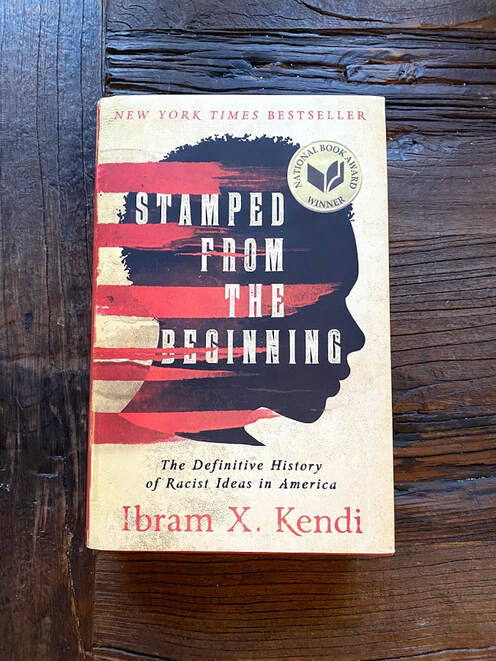Stamped from the Beginning: the Definitive History of Racist Ideas in America by Ibram X. Kendi5/31/2021 Stamped is one of the most meticulously researched books I’ve ever read. At almost 600 pages, it’s one you really need to own in print so you can underline and take notes for future reference. Ibram X. Kendi lays out the history of racist thought in America, revealing strategies that have failed to produce change and those that have perpetuated racism. He emphasizes that the self-interest of intelligent people creates policies that are racist and in turn preserves racist ideas. Racism has not and will not be eliminated or explained away through education. As long as racism continues to benefit the people who have the power to abolish it, they will never choose to eliminate it. America can only be antiracist when antiracists are in power and their policies become law.
Kendi examines this through the lens of five prominent people in history including Cotton Mather, Thomas Jefferson, William Lloyd Garrison, W.E.B. DuBois, and Angela Davis. Mather founded a philosophical society and crafted racist ideas as the first assimilationist. Mather pushed the religious justification that Christianity could make blacks better slaves, and by turning to this Christian God, blacks could be uplifted toward whiteness in their souls. Jefferson loathed slavery but feared losing his way of life filled with lavish hypocrisy. His views were contradictory, both abolitionist and racist as many of his writings included his thoughts on black inferiority. Garrison was considered radical because of his beliefs for immediate emancipation, yet he still shared the racist belief that blacks were inferior. The racial science theory of polygenesis begins to push the agenda that blacks are a different species. Black features are bad or ugly, and white is better. I found Kendi’s examination of Harriet Beecher Stowe’s Uncle Tom’s Cabin to be really interesting. He points out the racist views that this book categorized blacks as soulful and whites as the source of intellect. Although black, DuBois consumed racist ideas. He went to a white owned college with all white professors and believed that racism could be educated away. His famous book, The Souls of Black Folk enforced the racist idea of blacks having different characteristics – soulful and having a simple faith, whereas whites are portrayed as smart and strong. A new strategy develops that in order for blacks to change racist minds, they have to command white respect. When positive portrayals of blacks were used in media, racist whites often just dismissed it as extraordinary exceptions. DuBois spent his whole life urging blacks to uplift to white standards, but by the age of 65, he had turned to an almost completely antiracist viewpoint. He saw his life’s work urging moral uplift and education had changed virtually nothing when it comes to racist ideas in America. He began arguing for black empowerment instead of education and integration. Davis became active in the black power movement and is one of the most famous female antiracist academics. This book was insanely long and tedious to read, but I also felt enlightened in a whole new way from slogging through this dense history. It helped me understand how the complex issue of racism has been able to keep its grip on this country and a better approach for the future. Angela Davis really sums it up best. “In a racist society, it is not enough to be non-racist, we must be anti-racist.”
0 Comments
Leave a Reply. |
AuthorTravel All the Pages is inspired by my two loves - travel and reading, a combo I can't resist. Enjoy these little pairings. Archives
March 2023
Categories
All
|

